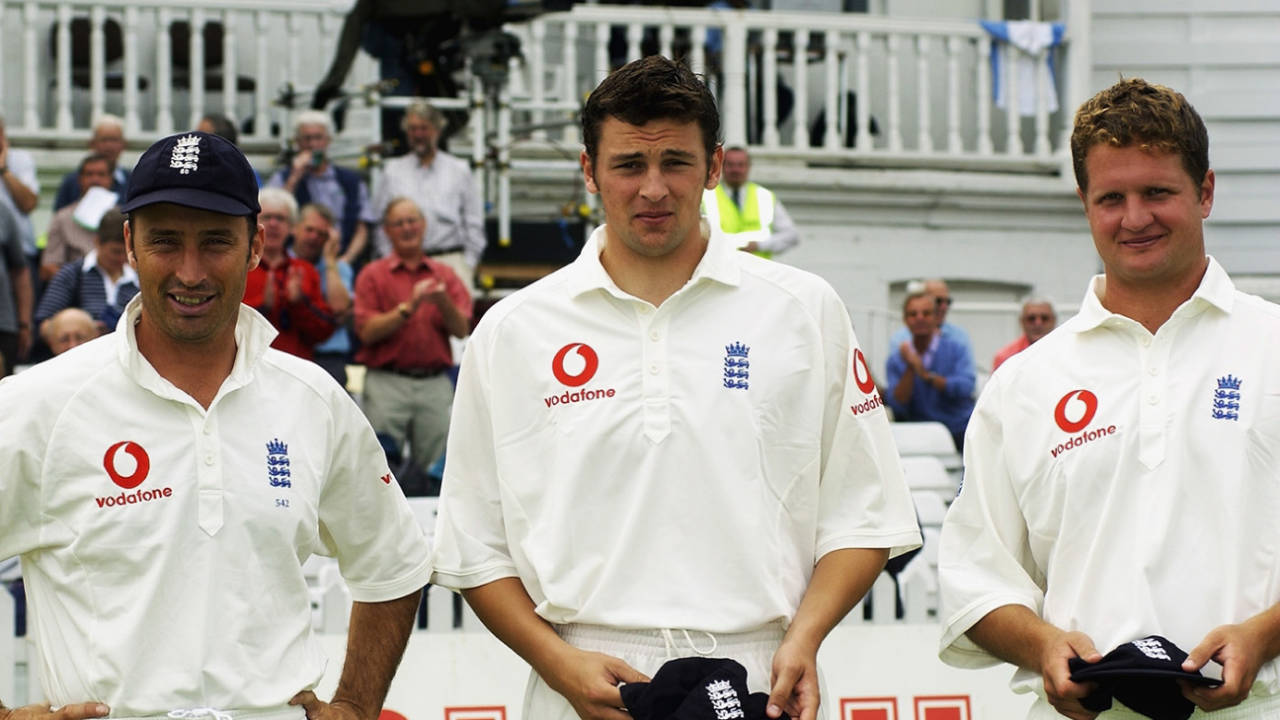Of all the demons that
Steve Harmison has faced, his
infamous opening delivery in Brisbane to kick off the 2006-07 Ashes - which ended up in the hands of his captain and best mate,
Andrew Flintoff, at second slip almost exactly 11 years ago - is one he seems most at peace with. It was, he admits, "the worst opening ball in the history of Ashes cricket" and one he knows he will always be remembered for. But, he adds, one bad ball does not an Ashes whitewash make. "When people say that set the tone for the series, that's bollocks."
Such is the uncompromising tone taken by Harmison through his revealingly frank autobiography, Speed Demons, published four years after his retirement in 2013. It is a raw retelling of a career that touched heights few Englishmen have achieved but ended with him battling a dependency on sleeping pills and antidepressants, uncertain as to what his post-playing days held in store.
"I never set out to be a cricketer," he writes early on, and it seems the game was both bane and cure. It provided a way for a school-averse teenager with few qualifications to go from being an apprentice bricklayer to representing his country in short order, as well as giving him the means to support a young family; but it was also responsible for taking him far away from home and hearth, where he felt most comfortable, and triggering the psychological issues that remain with him today.
The "homesick" label was
attached to Harmison almost from the outset. On an Under-19s tour of Pakistan, he ended up repeatedly waking Flintoff in the middle of the night to confide his feelings of anxiety. There began a mateship that undoubtedly played a key role in Harmison eventually going on to take 300-plus wickets for England: "[Flintoff] always jokes now that he spent a week trying to convince me to stay - and then a week trying to convince the management to send me home because he wanted some sleep!"
Harmison's natural attributes, as well as his own determination and the support of friends such as Flintoff, Rob Key and England physio Kirk Russell, would ensure many more sleepless nights to come. Full international recognition meant having to overcome his aversion to travelling, but taking part in the 2002-03 Ashes and the subsequent World Cup led to him seeing his daughter Abbie for just five days in the first six months of her life.
The following winter, Harmison exaggerated shin soreness to avoid going to Sri Lanka, though he had begun to realise he was actually dealing with
a serious illness. "I wanted to tour. I didn't want to finish my career with 50 caps when it could have been 85. I just had a mental health problem." During the summer of 2004, which he began as the world's No. 1-ranked bowler, Harmison was diagnosed with clinical depression.
It is testament to his grim-faced ambition to battle on through that one of his career peaks came while on tour. After getting into shape training at his beloved Newcastle United, Harmison lived up to his youthful billing as the "white West Indian" when he blew away the hosts
with a spell of 7 for 12 at Sabina Park. England, with their 6ft 5in, 90mph spearhead, went on to win ten Tests out of 11 against West Indies and New Zealand.
Yet the clouds were already gathering again and his lowest moment came before setting off to the airport for the 2004-05 tour of South Africa:
"At night, I lie there and stare into the dark. I am alone with my thoughts, and for me that's a dangerous place to be. Now, alone in my car, those thoughts are with me again. 'There are plenty of roundabouts on the short drive to Newcastle airport. What if pull out on somebody at one? If I do it right, I'll buy myself another few days at home.'"
Harmison did not deliberately crash his car to get out of touring, but that it even crossed his mind illustrates how debilitating his supposed "homesickness" had become. Still, throughout his playing career, he preferred to hang his issues on that peg - at least publically - in the belief that admitting to suffering from depression would have led to being dropped. Even when contemporaries such as
Marcus Trescothick and Mike Yardy opened up about similar conditions, Harmison kept the hatches battened down. "I'd spent so long telling myself that my head was not going to beat me that when other people began going under, it gave me even more determination."
For obvious reasons, it is therefore troubling that Harmison uses his book to question the reasons given by
Jonathan Trott for
leaving the 2013-14 Ashes tour. Having described how Trescothick was among those team-mates who questioned his commitment, only to re-evaluate in light of their own experiences, Harmison commits a similar error. The chapter entitled "Cricket's Problem", five pages that seem to exist purely to comment on Trott, who is labelled "not poorly" but "weak", could surely have been done without.
But then, it is a reminder that Harmison is also still finding his way. He remains, as most humans do, a collection of contradictions and impulses: a giant fast bowler who flinches from the memory of drawing Ricky Ponting's blood during the 2005 Ashes; a straight-talking Geordie who doesn't bear grudges, but nevertheless lists numerous fallings out that remain unresolved; a man who conquered his sphere but must now fill the "void" of retirement.
Life has slowed down but Harmison's demons abide with him. It's to be hoped that setting down his story has been a cathartic experience. He should be remembered for a lot more than one ball in Brisbane.
Speed Demons
By Steve Harmison
Trinity Mirror Sports Media
383 pages, £20

